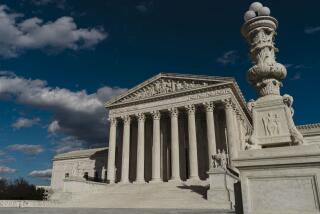Court to Hear Pension Case That Raises Bail-Out Fears
WASHINGTON â In a case that raises the specter of another multibillion-dollar government bail-out of private industry, the Supreme Court said Monday that it will decide whether a failing steel company may pass off its pension debts to a government-sponsored insurance fund.
In 1986, the Dallas-based LTV Corp. declared bankruptcy and turned over responsibility for $2 billion in pension liabilities to the Pension Benefit Guaranty Corp., a move that sent shudders through the agency.
LTV later resumed operations but refused to take back its pension debts. Two federal courts, relying on the bankruptcy laws, upheld the companyâs action.
Those rulings create an incentive for failing companies to rid themselves of their pension obligations, government lawyers said. They urged the Supreme Court to reverse the decisions.
In the end, the lawyers say, the taxpayers could be forced to bail out this insurance fund, just as they did the savings and loan fund after the costly collapse of that industry.
In 1974, Congress created the pension agency to guarantee pensions for nearly 40 million private sector workers. It is funded by payments from private employers and is supposed to be self-sustaining. However, like the former Federal Savings and Loan Insurance Corp., which insured deposits in savings and loans institutions, the taxpayers must pick up the tab if the insurance fund goes broke.
Last year, the Pension Benefit Guaranty Corp. said it had assets of $2.6 billion and liabilities of $4 billion--without counting the $2-billion LTV liability.
In their appeal to the Supreme Court, lawyers for the agency said that the lower court rulings in LTVâs favor âthreaten to paralyze the agencyâs efforts to control abuses of the national pension insurance system.â If LTV succeeds, the Pension Benefit Guaranty Corp. âcould then become an open-ended source of industry bail-outs . . . with escalating costs to premium payers and, ultimately, workers.â
So far, workers and retirees have not suffered any losses due to LTVâs action. Workers began receiving some benefits under the government-guaranteed plan after the company dumped its pension obligations in 1986. In 1987, the company agreed to supplement the government-paid benefits. As a result, the only loser in the arrangement was the pension guaranty agency.
The steel firm continues to argue that it cannot afford the cost of the outstanding pensions. The case (PBGC vs. LTV Corp., 89-390) will be heard early next year, and a ruling is expected by July.
In other actions, the court:
Agreed that a state center for retarded children may not force its employees to be tested for AIDS. Without comment or dissent, the justices left standing two lower court rulings striking down a testing program sponsored by the Eastern Nebraska Community Office of Retardation. However, the lower courts said their rulings were narrow and should not be seen as a sweeping rejection of AIDS testing. The high court has yet to rule directly on the issue.
In 1987, the directors of the Nebraska center imposed the testing requirement because of fears that employees might be bitten by the children. The testing covered several infectious diseases, including hepatitis, tuberculosis and AIDS. The employees filed suit, contending that the mandatory tests violated their privacy rights. A trial judge ruled in their favor, concluding that the chances of an employeeâs spreading AIDS to a child were negligible. An appeals court upheld that ruling in February (Eastern Nebraska Community Office vs. Glover, 88-1805).
Let stand a ruling that said a policeman may not chase a fleeing motorist into his home to arrest him without a search warrant. In the past, the high court has permitted officers in âhot pursuitâ to chase down a fleeing suspect. But the court has also said that, in the case of a person suspected of a âminor offense,â an officer may not forcibly enter a home. In this case, a New Jersey policeman had pursued for several miles a fleeing motorist who pulled into his garage and shut the door. The officer entered the house and arrested the suspect, but the New Jersey Supreme Court said this warrantless arrest was illegal (New Jersey vs. Bolte, 89-417).
Agreed to decide whether a person other than the primary resident may legally permit police officers to enter and search the premises. An Illinois appeals court threw out drug evidence found in the home of a Chicago man because his part-time girlfriend let officers conduct the search. In their appeal, state prosecutors said the so-called âexclusionary ruleâ was designed only to deter unlawful actions by the police and that, in this instance, the police thought they had acted legally (Illinois vs. Rodriquez, 88-2018).
More to Read
Inside the business of entertainment
The Wide Shot brings you news, analysis and insights on everything from streaming wars to production â and what it all means for the future.
You may occasionally receive promotional content from the Los Angeles Times.










